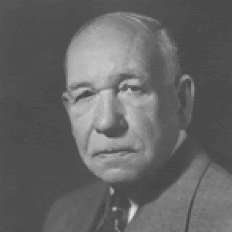Presidential Address
The American Frontier—Frontier of What?
In Memoriam
From the American Historical Review 70:2 (January 1965)
Carlton J. H. Hayes (May 16, 1882–September 3, 1964). When Carlton Hayes died, on September 3, there passed from the American Historical Association a scholar who had served it for many years in many capacities and had been for the greater part of this twentieth century a leading figure in the American historical world. Death came at the age of eighty-two in a hospital near his home (“Jericho Farm”) at Afton, New York. In birth, ancestry on both sides, and early associations he was a thorough New Yorker, but an up-State New Yorker, as he sometimes liked to emphasize in conversation, even though residence on Manhattan Island for most of the year became routine in his life after he committed himself to Columbia, first as student, undergraduate and graduate, and then as teacher and faculty member. He never ceased to love the up-State, though it was as le pays rather than as la patrie that the severe critic-to-be of nationalism cherished it. In his most recent book, Nationalism: A Religion (1960), there occurs a short, and charming, autobiographical passage:
In French, distinction is usefully made between patrie (one’s whole nation or “fatherland”) and pays (one’s immediate homeland). Everybody, besides having a patrie, has a pays. My own pays is New York, particularly the south-central part of Upstate New York. Here I was born and spent my youth. Here five generations of both paternal and maternal ancestors lived and are buried. Here is my true home, along the gently flowing Susquehanna and amid the smiling wooded hills. Hither I resort whenever I can.
Professor Hayes’s rise to fame was exceptionally rapid. Of the factors that contributed to it, the first, chronologically, was his outstanding success as a teacher in history courses, undergraduate and graduate, at Columbia. His lectures were not only carefully prepared and clearly organized, but were spiced with a dramatic mode of presentation that appealed strongly to most of his students. The more serious-minded among them were greatly impressed by his seminars, from which there emerged in due course a great many doctoral dissertations, a large proportion of them dealing with subjects related to what became, in the days of World War I, and remained, until the end of his life, the dominant theme in his historical interest and teaching and writing, the great theme of nationalism. This he developed at length and in detail, with boundless energy and unflagging zeal, in articles and books, beginning with an article written for the Political Science Quarterly in 1914 and closing with Nationalism: A Religion, which he himself described as “a brief summing up of what one person, through a lifetime of study, has conceived and learned about nationalism, with special regard to its story in Europe and with tentative reflections on its present course on other continents.” It would seem natural that one in whose life religion played so dominant a part as it did in his should associate it so closely as he did in this valedictory publication with what had become, for him, the chief theme of history.
Besides the more specialized books that Professor Hayes devoted, mainly or largely, to nationalism (his Essays on Nationalism, France, A Nation of Patriots, The Historical Evolution of Modern Nationalism, and A Generation of Materialism, 1871–1900, are examples), he wrote extraordinarily successful textbooks on modern European history in general. These spread far and wide in our colleges and high schools, among teachers and students, his reputation as a historian.
Bibliography
An introduction to the sources relating to the Germanic invasions, by Carlton Huntley Hayes. New York, 1909; Reprint New York: AMS Press, 1967.
A political and social history of modern Europe, by Carlton J. H. Hayes. 2 vols. New York: Macmillan, 1916.
A brief history of the great war, by Carlton J. H. Hayes. New York: Macmillan, 1920.
Modern history, by Carlton J. H. Hayes and Parker Thomas Moon. New York: Macmillan, 1923.
Essays on nationalism, by Carlton J. H. Hayes. New York: Macmillan, 1926.
Ancient and medieval history, by Carlton J. H. Hayes and Parker Thomas Moon. New York: Macmillan, 1929.
France, a nation of patriots, by Carlton J. H. Hayes. New York: Columbia University Press, 1930; Reprint, New York, Octagon Books, 1974.
Analytical survey of modern European history. New York: Macmillan, 1930-31.
The historical evolution of modern nationalism, by Carlton J. H. Hayes. New York: R.R. Smith, 1931.
A generation of materialism, 1871-1900, by Carlton J.H. Hayes. New York, London, Harper & Brothers, 1941; Reprint, Westport, Conn: Greenwood Press, 1983.
This inevitable conflict, by Carlton J. H. Hayes. New York: Columbia University Press, 1942.
Wartime mission in Spain, 1942-1945, by Carlton J.H. Hayes, late American ambassador to Spain. New York: Macmillan, 1945.
Nationalism and internationalism; essays inscribed to Carlton J. H. Hayes. New York: Columbia University Press, 1950; Reprint, New York: Octagon Books, 1974.
Modern Europe to 1870. New York: Macmillan, 1953.
Christianity and Western civilization. Stanford: Stanford University Press, 1954; Reprint, Westport, Conn.: Greenwood Press, 1983.
Nationalism: a religion. New York: Macmillan, 1960.
